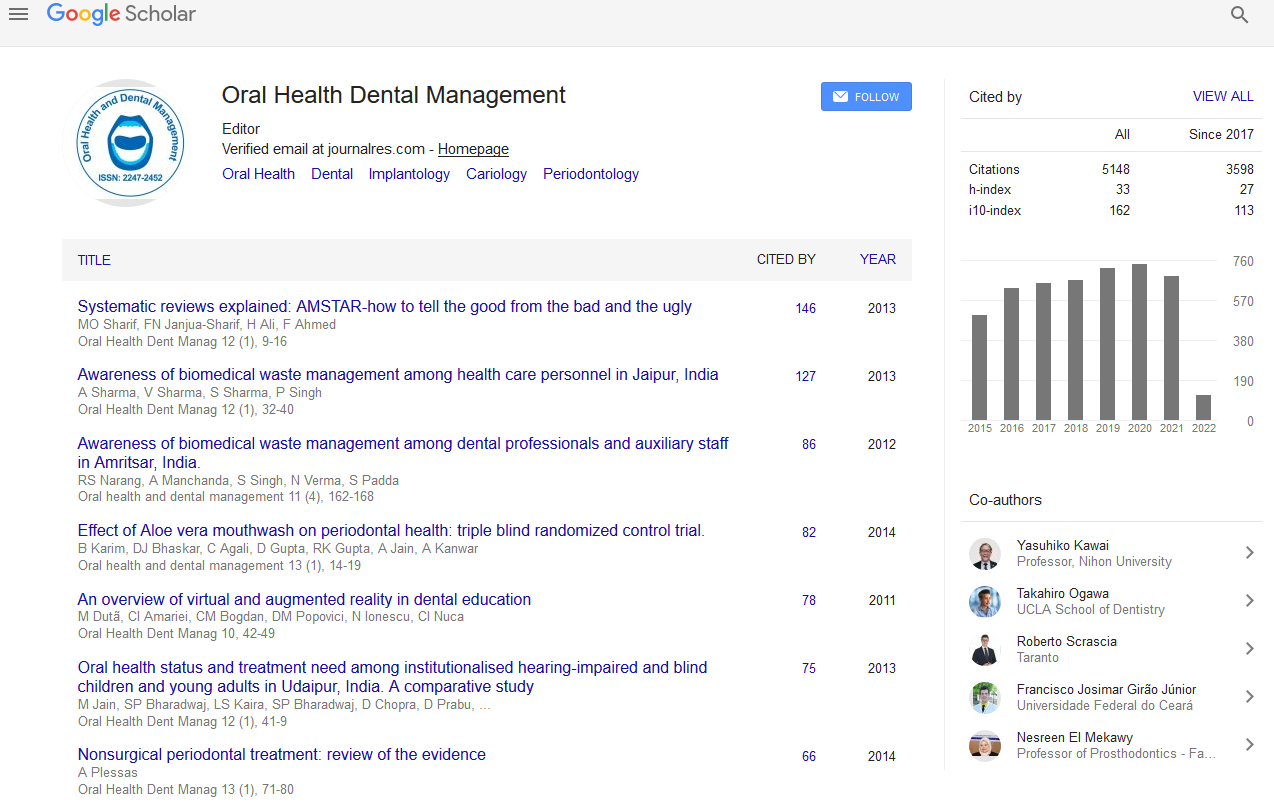Indexed In
- The Global Impact Factor (GIF)
- CiteFactor
- Electronic Journals Library
- RefSeek
- Hamdard University
- EBSCO A-Z
- Virtual Library of Biology (vifabio)
- International committee of medical journals editors (ICMJE)
- Google Scholar
Useful Links
Share This Page
Journal Flyer

Open Access Journals
- Agri and Aquaculture
- Biochemistry
- Bioinformatics & Systems Biology
- Business & Management
- Chemistry
- Clinical Sciences
- Engineering
- Food & Nutrition
- General Science
- Genetics & Molecular Biology
- Immunology & Microbiology
- Medical Sciences
- Neuroscience & Psychology
- Nursing & Health Care
- Pharmaceutical Sciences
Prosthetic reconstruction for post cancer patients
10th Dentists and Prosthodontics Annual Meeting
June 27-28, 2016 New Orleans Louisiana, USA
Syeda Maliha Waqar
Dow University of Health Sciences, Pakistan
Posters & Accepted Abstracts: Oral Health Dent Manag
Abstract:
One of the major challenges facing head and neck oncology is the restoration of function after oncologic surgery of the oral cavity. Dental rehabilitation is crucial for achieving good outcomes. Pre-surgical planning with the restoring prost-hodontist is mandatory before implant surgery. For many investigators, the facial skeletal deformities and unfavorable anatomy of the intraoral soft tissues often constituted insurmountable obstacles for dental rehabilitation and functional reconstruction. Within the general objective of securing esthetic as well as functional reconstructions, dental rehabilitation is an important consideration for achieving a good outcome. Adequate dental rehabilitation allows the patient to chew food and considerably improves speech and swallowing. Prosthodontic treatments depend on the degree of edentulousness or the type of defect present. Maxillary defects are created by surgical treatment of benign or malignant neoplasms, congenital malformation and by trauma. The size and location of the defects influence the degree of impairment and difficulty in prosthetic rehabilitation. Lack of support, retention, and stability are common prosthodontic treatment problems for patients who have had a maxillectomy. A prosthesis used to close a palatal defect in a dentate or edentulous mout h is referred to as an obturator. The obturator prosthesis is used to restore masticatory function and improve speech, deglutition and cosmetics for maxillary defect patients. Rehabilitation with a maxillary obturator is successful in restoring preoperative speech function. Rehabilitation of individuals with involvement of the soft palate may be more challenging. Speech outcome measurements are valuable in guiding treatment and determining the effectiveness of rehabilitation with a maxillary obturator prost hesis in individuals with palatal resection.
Biography :
Syeda maliha waqar graduated in 2015 as a bachelor of dental surgery from Dow University Of Health Sciences and recently completed one year experience as a general dentist. She loves working with individuals that have dental anxiety or special needs. Her efficiency, conscientiousness and gentle manner are most appreciated by her patients. Because of her keen interest she worked periodically in different private practice. She often participates in different dental conferences and present her research work to explore more about new discoveries in the field.
Email: syedamalihawaqar@hotmail.com

